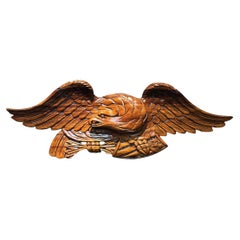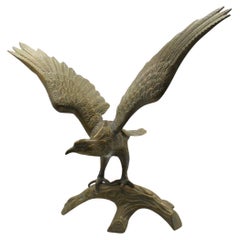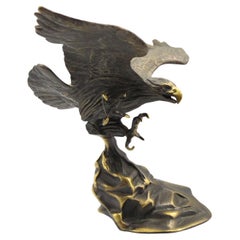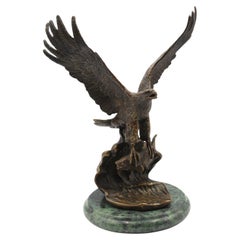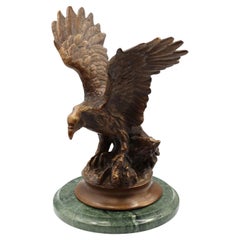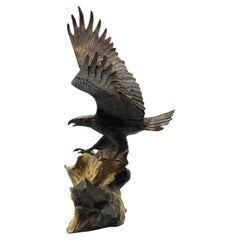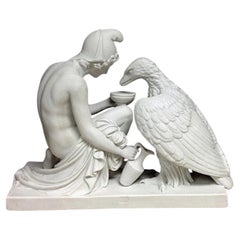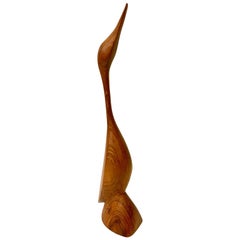The Great Republic Decorative Objects
to
2
13
1
2
11
1
5
1
5
3
1
1
2
2
12
6
4
2
1
14
7
7
4
4
2
Height
to
Width
to
14
14
14
1
Vintage Hand-Carved Teak Bellamy Eagle with Shield
Located in Colorado Springs, CO
Presented is a beautiful hand-carved spreadwing eagle plaque. This early 20th century wood eagle is carved of teak and handsomely polished. With its feather spread out, the eagle clu...
Category
Early 20th Century American Animal Sculptures
Materials
Teak
Vintage "American Bald Eagle Upon Landing" Brass Sculpture, circa 1960s
Located in Colorado Springs, CO
Presented is a vintage brass sculpture, "American Bald Eagle Upon Landing." Made in America in the early 1960s, this sculpture features a large-scale, realistically cast bald eagle. ...
Category
Vintage 1960s American Animal Sculptures
Materials
Brass
"American Bronze Eagle" Sculpture by Gorham, 1994
Located in Colorado Springs, CO
This bronze sculpture depicts a majestic bald eagle with its wings fully spread open, taking flight from a rocky outcropping. With an intense stare and intricate feather detail, this...
Category
1990s American Animal Sculptures
Materials
Bronze
Vintage Bronze Eagle with Fish Sculpture, after Edward Chope, Late 20th Century
Located in Colorado Springs, CO
This is a bronze eagle on a marble base, after Edward Chope, circa late 20th century. The bronze sculpture depicts a majestic bald eagle with its wings fully spread open, soaring ove...
Category
Late 20th Century Animal Sculptures
Materials
Bronze
Vintage Bronze Eagle on Rocks, after Jules Moigniez, Late 20th Century
Located in Colorado Springs, CO
This is a bronze eagle on rocks sculpture, after Jules Moigniez, circa late 20th century. The bronze sculpture depicts a majestic bald eagle with its wings fully spread open, landing...
Category
Late 20th Century Animal Sculptures
Materials
Bronze
"Wings of Glory" Bronze Eagle Sculpture, Ronald Van Ruyckevelt
Located in Colorado Springs, CO
This bronze sculpture by British contemporary artist Ronald Van Ruyckevelt is a reproduction of his 1990 bronze masterpiece, “Wings of Glory.” The bronze depicts a majestic bald eagl...
Category
1990s Animal Sculptures
Materials
Bronze
Vintage Cast-Iron Eagle Sculpture, Early 20th Century
Located in Colorado Springs, CO
This is a cast-iron figural eagle doorstop, circa early 20th century. The eagle is depicted with wings spread wide, perched and mounted to a square marble base. The eagle retains traces of its original gilt surface and is embossed with “F.O.E.” at its midsection, possibly referring to the Fraternal Order of Eagles.
The eagle is both the national bird and the national animal of the United States. The eagle motif has been widely used throughout American history, most notably as part of our Great Seal. The founders of the United States were fond of comparing their new republic with the Roman Republic, in which eagle imagery, usually the golden eagle, was prominent. On June 20, 1782, the Continental Congress adopted the design for the Great Seal of the United States...
Category
Early 20th Century American Federal Animal Sculptures
Materials
Marble, Iron
Handcrafted Cigar Humidor Stamped with Elephant, Heart Pine with Rosewood Trim
Located in Colorado Springs, CO
A handsome handcrafted cigar humidor, made from heart pine. This humidor is an exclusive product to The Great Republic, created in a limited edition of only 25. The lid of this distinctive humidor is hand-stamped with an elephant, complete with Rosewood trim.
The elephant appears to be in mid-stride with large tusks...
Category
21st Century and Contemporary American Cigar Boxes and Humidors
Materials
Wood
Silver Plated Keepsake Box, Early 20th Century
Located in Colorado Springs, CO
Offered is a silver plated keepsake box, dating to the early 1900s. The hallmarked box offers great storage solution for jewelry, cufflinks, and other keepsakes, with a divided inter...
Category
Antique Early 1900s English Jewelry Boxes
Materials
Silver
"Come Forth A Dream" Bronze Sculpture by Veryl Goodnight, Ed. 19/25, 1987
Located in Colorado Springs, CO
Presented is an original signed bronze sculpture by American artist Veryl Goodnight. The sculpture is called "Come Forth A Dream" and depicts four running horses, galloping together with free-spirited and unbridled energy. The patinated bronze was cast in 1987 in a very limited edition of only 25. This specific bronze is signed, dated, and numbered 19/25.
Veryl Goodnight(b, 1947) is a celebrated contemporary American artist working in Southwest Colorado. Her studio ranch is situated between Durango and Mesa Verde National Park and the dramatic landscape, abundant wildlife, and fellow ranching community provide endless inspiration for her art. Her many years spent in the West, observing, painting, and sketching her surroundings, gave Goodnight a profound awareness of the mannerisms of ranchers and animals alike. This experience translates directly to her art.
Goodnight has monumental sculptures across the United States, in Europe, and Japan. The most notable is “The Day The Wall Came Down...
Category
Vintage 1980s American Animal Sculptures
Materials
Bronze
Hallmarked Silver Plated Keepsake Box, Sheffield, Uk, Circa 1900
Located in Colorado Springs, CO
Offered is a stunning Sheffield silver keepsake box dating to 1900, with associated hallmark. This small box includes a clean interior and rounded corners. The box is free of names or initials, but would have been used to house keepsakes such as jewelry or cufflinks. A well maintained, elegant piece, this antique silver box is an excellent addition to any silver collection.
Trinket or keepsake boxes have taken on many forms since their first conception in ancient times. However their purpose remains the same; to store jewelry and other items precious to the owner. Originally, these boxes were used specifically for jewelry. These were in common use as early as 5000 BC in Ancient Egypt, when the majority of Egyptians, both male and female, wore jewelry. Boxes were used to keep these gemstone encrusted items safe. In Ancient Rome, jewelry was a status symbol. Rings and brooches were utilized to represent ones status in society. Again, boxes were needed for security and storage purposes. Finding early examples of these are quite rare.
Victorian and Edwardian examples of trinket boxes are far more common. This is because owning jewellery was a luxury until the Victorian era- let alone possessing so much a box was needed to store it all. Fine jewelry and other items became available to the masses after the industrial revolution due to the reduction in production costs. This led to a demand for trinket boxes, which were much smaller than jewelry boxes and therefore better suited to the needs of the middle class who did not yet possess an abundance of jewelry.
In Victorian households, collectables and other items of interested were also stashed inside these boxes. This is why they are known as trinket or keepsake boxes, rather than just jewelry boxes, although of course jewelry was also stored in them. Trinket boxes were produced in large numbers around this time. Many were lined with colored plush or velvet or rich wood. More elaborate designs had interior divisions and trays for rings and other pieces of jewellery. It was also common to see trinket boxes so small that they could only contain one item, such as a single ring. Ornate exteriors were created to reflect the value of the trinket boxes contents.
The Edwardian era saw the introduction of new styles of trinket box. These included small circular or oblong boxes...
Category
Antique Early 1900s British Art Deco Decorative Boxes
Materials
Silver
Hallmarked Silver Plated Keepsake Box, Sheffield, UK, circa 1900
Located in Colorado Springs, CO
Offered is a stunning silver plated keepsake box dating to 1900, with associated hallmark. This small box includes a wooden interior with two slots and a blank square on top where initials could have been engraved. A well maintained, elegant piece, this antique silver box is an excellent addition to any silver or home decor collection.
Trinket or keepsake boxes have taken on many forms since their first conception in ancient times. However their purpose remains the same; to store jewelry and other items precious to the owner. Originally, these boxes were used specifically for jewelry. These were in common use as early as 5000 BC in Ancient Egypt, when the majority of Egyptians, both male and female, wore jewelry. Boxes were used to keep these gemstone encrusted items safe. In Ancient Rome, jewelry was a status symbol. Rings and brooches were utilized to represent ones status in society. Again, boxes were needed for security and storage purposes. Finding early examples of these are quite rare.
Victorian and Edwardian examples of trinket boxes are far more common. This is because owning jewellery was a luxury until the Victorian era- let alone possessing so much a box was needed to store it all. Fine jewelry and other items became available to the masses after the industrial revolution due to the reduction in production costs. This led to a demand for trinket boxes, which were much smaller than jewelry boxes and therefore better suited to the needs of the middle class who did not yet possess an abundance of jewelry.
In Victorian households, collectables and other items of interested were also stashed inside these boxes. This is why they are known as trinket or keepsake boxes, rather than just jewelry boxes, although of course jewelry was also stored in them. Trinket boxes were produced in large numbers around this time. Many were lined with colored plush or velvet or rich wood. More elaborate designs had interior divisions and trays for rings and other pieces of jewellery. It was also common to see trinket boxes so small that they could only contain one item, such as a single ring. Ornate exteriors were created to reflect the value of the trinket boxes contents.
The Edwardian era saw the introduction of new styles of trinket box. These included small circular or oblong boxes...
Category
Antique Early 1900s English Art Deco Decorative Boxes
Materials
Silver
$600 Sale Price
20% Off
Benjamin Harrison Indian Peace Medal on Presentation Collar, 1889
Located in Colorado Springs, CO
Presented is an original Benjamin Harrison presidential peace medal. This bronze medal was originally struck by the U.S. Mint in 1889 as a peace offering to the various Native American tribes in the U.S. The obverse of the medal has a raised relief side profile bust of President Harrison, with the text "Benjamin Harrison President U.S.A. 1889". The reverse of the medal has the word "PEACE" at top, with a scene of a settler and Native American talking in front of a log cabin. Below, a crossed tomahawk and peace pipe are enclosed by a wreath of laurel leaves. The medal is displayed on a blue velvet presentation collar with gold striped edging and light purple fabric on the reverse. The medal is attached under a blue fabric covered button.
Following the British and French practice of handing out silver medals to tribal chiefs, George Washington began a policy of presenting peace medals to American Indian leaders at treaty signings and other formal ceremonies. Every subsequent American president from Thomas Jefferson to Benjamin Harrison is represented on a presidential peace medal, with the exception of William Henry Harrison...
Category
Antique 1880s American Historical Memorabilia
Materials
Bronze
$2,800 Sale Price
20% Off
Silver Sheffield Cricket Sugar Jar, circa 1900
Located in Colorado Springs, CO
This is an exquisite early 20th century crystal jar with a silver lid and spoon. The lid's top is fashioned after a cricket wicket. The jar sits on a round silver base with decorativ...
Category
Antique Early 19th Century British Sheffield and Silverplate
Materials
Silver
Related Items
Ganymede And The Eagle Sculpture, 20th century
Located in Southall, GB
This 20th-century sculpture of Ganymede and the Eagle captures the iconic mythological scene with striking detail and artistry. Depicting the young Ganymede being carried away by Zeu...
Category
20th Century English Busts
Materials
Marble
Danish Modern Solid Teak Hand-Carved Duck Sculpture
By Kay Bojesen
Located in San Diego, CA
Whimsical hand-carved duck sculpture in solid teak unsigned, circa 1960s.
Category
20th Century American Scandinavian Modern Animal Sculptures
Materials
Teak
Male and Female Sculpture, circa 1960s
By Alva Museum Replicas, Inc.
Located in New York, NY
A vintage midcentury reproduction of a figurative male and female 'embracing' sculpture on black marble base, 1963, New York, New York. Sculpture has maker's mark on side and on bott...
Category
Vintage 1960s American Modern Figurative Sculptures
Materials
Composition, Marble
St Denis. by R. Van Ruyckevelt Porcelain Sculpture
Located in Dallas, TX
R. Van Ruyckevelt, St. Denis gilded and decorated porcelain sculpture of a black raspberry branch. Set on a rectangular marble base. Malvern, England, 20th century.
Category
Vintage 1970s English Figurative Sculptures
Materials
Marble
1960s Emil Milan Rosewood Brass Table Lighter Sculpture American Studio Craft
By Emil Milan
Located in Hyattsville, MD
Wonderful and rare large table lighter by Emil Milan in E.T. rosewood. Lighter is not functioning, will need flint and fuel.
Category
Vintage 1960s American Mid-Century Modern Tobacco Accessories
Materials
Wood
$2,800 Sale Price
20% Off
H 8 in W 2.32 in D 3 in
Zai Wang, Eagle Sculpture, Patinated Bronze, Chinese, 1960s
Located in Manhasset, NY
Eagle sculpture.
Made by Zai Wang.
Category
Antique Late 19th Century Animal Sculptures
Materials
Bronze
The Running Stags after Jules Moigniez
By Jules Moigniez
Located in Dallas, TX
Patinated bronze stags standing over rocky outcrop, signed after Jules Moigniez with marble base.
Category
Antique 18th Century Animal Sculptures
Materials
Bronze
19th Century American Federal Bronze Bald Eagle Wall Hanging Sculpture, Large
By LaBarge
Located in Germantown, MD
A rare 19th Century Bronze American Federal Bald Eagle Wall Hanging sculpture, Large. Very Heavy.
Measures 19.5" in width, and 22" in height.
Category
Antique Late 19th Century American American Empire Animal Sculptures
Materials
Bronze
$1,796 Sale Price
25% Off
H 22 in W 19.5 in D 4 in
Vintage Patinated Bronze Sculpture 'American Bald Eagle Upon Landing'
Located in West Palm Beach, FL
Vintage patinated bronze sculpture 'American Bald Eagle Upon Landing'
USA, Circa 1960s
Of large scale, realistically cast and modeled of a land...
Category
20th Century American American Classical Animal Sculptures
Materials
Bronze
$2,200 Sale Price
20% Off
H 25.5 in W 21.5 in D 12 in
Hand Carved Eagle By
Located in Los Angeles, CA
Hand carved eagle in fine condition and rare to find by Thomas Rhodes carver from Arizona.The shape & form is the best.
Category
Vintage 1940s American Adirondack Animal Sculptures
Materials
Wood
Antique Giltwood & Gesso Coat of Arms with Eagle – Hand-Carved Decorative Crest
Located in Lincoln, GB
18th Century Carved Giltwood & Gesso Coat of Arms with Eagle – Rare Decorative Crest on Metal Stand
A stunning and rare 18th-century carved giltwood and gesso coat of arms, this exce...
Category
Antique 18th Century Mounted Objects
Materials
Giltwood
$961
H 19.7 in W 10.6 in D 2.8 in
19th Century French Patinated Bronze Pig Sculpture Signed Jules Moigniez
By Jules Moigniez
Located in Dallas, TX
Decorate a shelf or desk with this fine antique bronze sculpture. Created in France circa 1880 and built of bronze, the farm animal stands on a flat brass base and depicts a sow snif...
Category
Antique Late 19th Century French Animal Sculptures
Materials
Bronze, Brass
$1,950
H 6 in W 9.5 in D 5.25 in
